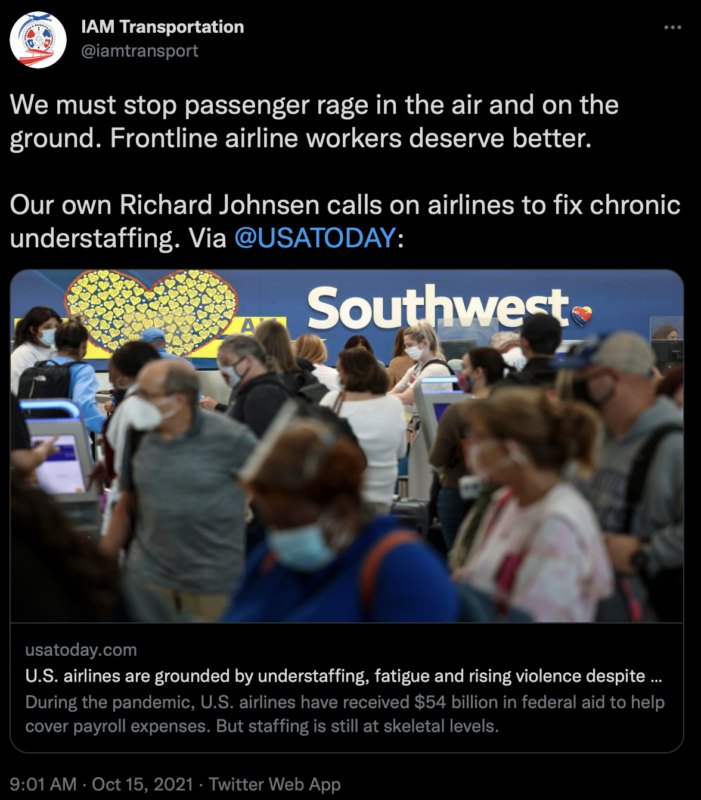Chief of Staff Johnsen Addresses Unruly Passengers and chronic understaffing

Richard Johnsen, Chief of Staff to the International President, wrote an op-ed in today’s USA TODAY addressing unruly passengers and understaffing issues in the airline industry.
There has been a lot of news lately about air rage. You’ve probably seen the viral videos: violent passengers, many angry about mask policies, throwing punches at flight crews and putting other passengers at risk.
It’s happening on the ground, too. Airport workers like customer service agents are usually the first contact for travelers at the airport, and often the first in line for abuse.
The Federal Aviation Authority has imposed stiffer penalties for violent offenders and stepped up public awareness campaigns to try to deter the violence in the first place. But those measures alone aren’t working.
As we head into the holiday season, the number of unruly passenger incidents is still rising. As of Tuesday, according to the FAA, there have been more than 4,700 unruly passenger reports, over 3,400 mask-related incidents and about 880 investigations initiated – nearly tripling the previous peak of 310 in 2004.

Understaffing is fueling violence The FAA has asked the International Association of Machinists and Aerospace Workers (IAM) for solutions, and here’s what we’ve told them: Chronic understaffing is fueling stress and anger in airports and on planes, and until that’s fixed, the violence is going to continue to rise.
This past weekend, thousands of passengers were left stranded when Southwest Airlines canceled about 2,000 flights and delayed hundreds more. Weather and air traffic control were cited as factors, but the unavoidable reality is that Southwest Airlines, like other airlines, is woefully understaffed, and its workers are burned out. The IAM has addressed this issue on multiple occasions with management.
Domestic air travel is increasing to pre-pandemic levels. Airlines – not just Southwest – are overwhelmed and understaffed, meaning sudden cancelations, longer wait times and significant flight delays, all of which are leaving passengers understandably frustrated.
To make matters worse, in some cities, airport concession stands and restaurants aren’t adequately staffed or open, leaving stranded travelers with fewer options for food and beverages, and even more irritated.
It has all meant more stress for travelers and workers alike, both in flight and on the ground. And our members are experiencing firsthand how that stress leads to more violence.
Over the past few months, I’ve traveled to airports across the country to talk to our members. And no matter where I go – Washington, Philadelphia, Newark, Chicago, Phoenix or Houston – workers tell me the same thing: Staff shortages leave them overworked and exhausted, and are making the violence and abuse they endure far worse. Our members say they go to work these days expecting to be insulted, threatened, yelled at and even punched by angry travelers.
Airlines are woefully unprepared.
The violence can turn ugly in other ways, too, especially for workers of color. In August, a man went on a violent rampage at Miami International Airport, hurling racial slurs at one gate agent and threatening him with a stanchion raised in the air before stomping off, still yelling and kicking a wet-floor sign into the air.
There’s no excuse for airline staffing shortages. Since the start of the pandemic, U.S. airlines have received $54 billion in federal aid to help cover payroll expenses. That cash came with conditions: Carriers were prohibited from furloughing or laying off workers. But the airlines still persuaded tens of thousands of employees to take buyouts, early retirement or leaves of absence, leaving staffing at skeletal levels.
Predictably, that has left airlines unprepared as the number of people flying ramps up to pre-pandemic levels. In July, on the Aviation Labor Recovery Roundtable call with FAA Administrator Steve Dickson and Transportation Deputy Secretary Polly Trottenberg, I implored everyone to ensure airlines urgently use the billions they’ve received in federal relief to address staffing shortages.
That urgent call has been echoed by others, like Sen. Maria Cantwell, D-Wash., who has written to each airline demanding answers.
“These shortages come in the wake of unprecedented federal funding that Congress appropriated, at the airlines’ request, to support the airline industry during the COVID-19 pandemic,” she wrote. That funding was supposed to be used to keep workers on the payroll “so that the industry was positioned to capture a rebound in demand.”
Like us, Cantwell has demanded answers. And all of us, especially the travelers and workers bearing the brunt of the shortages, deserve answers.
Our members have been on the front lines since the pandemic started. Getting passengers to their destination safely and on time – even before COVID-19 – has always been their priority.
Now it’s up to the airlines to demonstrate that this is their priority, too, by fixing the chronic understaffing causing delays and cancellations and making the air rage, and ground rage, worse.
Richard Johnsen is chief of staff to the president of the International Association of Machinists and Aerospace Workers, which represents more than 160,000 active and retired members in the airline and rail industries, making it the largest airline union in North America. He began his career as a mechanic assistant for United Airlines in 1988.
U.S. airlines must fix understaffing for air travel success and safety (usatoday.com)